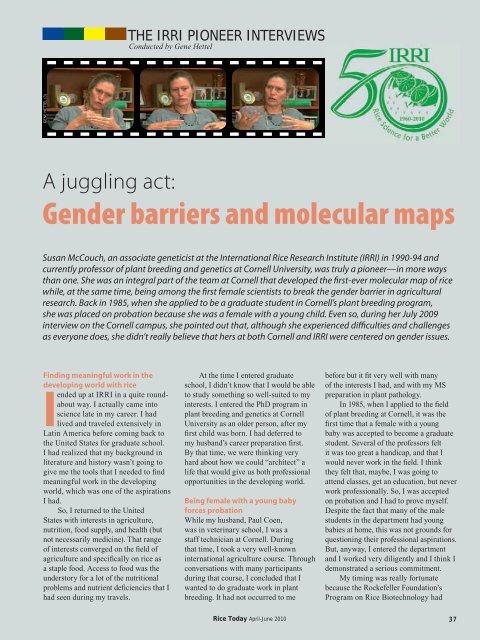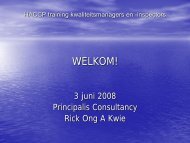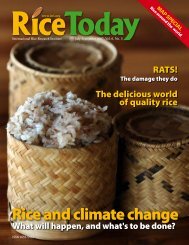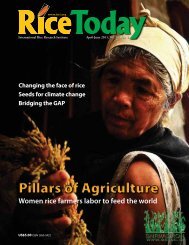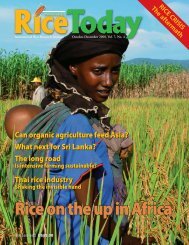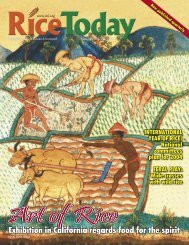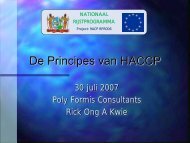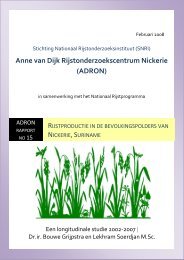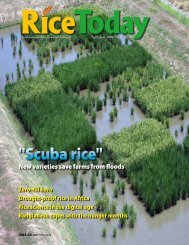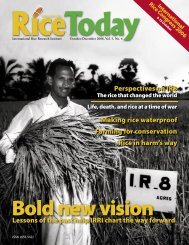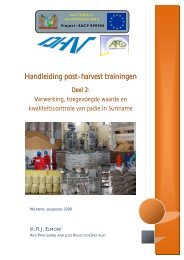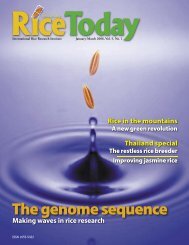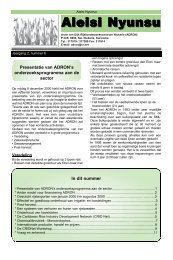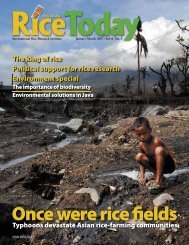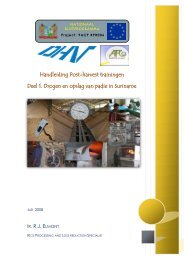A sunburned grain Stamps of approval Pockets of gold in ... - adron.sr
A sunburned grain Stamps of approval Pockets of gold in ... - adron.sr
A sunburned grain Stamps of approval Pockets of gold in ... - adron.sr
You also want an ePaper? Increase the reach of your titles
YUMPU automatically turns print PDFs into web optimized ePapers that Google loves.
THE IRRI PIONEER INTERVIEWSConducted by Gene HettelGENE HETTEL (3)A juggl<strong>in</strong>g act:Gender barriers and molecular mapsSusan McCouch, an associate geneticist at the International Rice Research Institute (IRRI) <strong>in</strong> 1990-94 andcurrently pr<strong>of</strong>essor <strong>of</strong> plant breed<strong>in</strong>g and genetics at Cornell University, was truly a pioneer—<strong>in</strong> more waysthan one. She was an <strong>in</strong>tegral part <strong>of</strong> the team at Cornell that developed the first-ever molecular map <strong>of</strong> ricewhile, at the same time, be<strong>in</strong>g among the first female scientists to break the gender barrier <strong>in</strong> agriculturalresearch. Back <strong>in</strong> 1985, when she applied to be a graduate student <strong>in</strong> Cornell’s plant breed<strong>in</strong>g program,she was placed on probation because she was a female with a young child. Even so, dur<strong>in</strong>g her July 2009<strong>in</strong>terview on the Cornell campus, she po<strong>in</strong>ted out that, although she experienced difficulties and challengesas everyone does, she didn’t really believe that hers at both Cornell and IRRI were centered on gender issues.F<strong>in</strong>d<strong>in</strong>g mean<strong>in</strong>gful work <strong>in</strong> thedevelop<strong>in</strong>g world with riceIended up at IRRI <strong>in</strong> a quite roundaboutway. I actually came <strong>in</strong>toscience late <strong>in</strong> my career. I hadlived and traveled extensively <strong>in</strong>Lat<strong>in</strong> America before com<strong>in</strong>g back tothe United States for graduate school.I had realized that my background <strong>in</strong>literature and history wasn’t go<strong>in</strong>g togive me the tools that I needed to f<strong>in</strong>dmean<strong>in</strong>gful work <strong>in</strong> the develop<strong>in</strong>gworld, which was one <strong>of</strong> the aspirationsI had.So, I returned to the UnitedStates with <strong>in</strong>terests <strong>in</strong> agriculture,nutrition, food supply, and health (butnot necessarily medic<strong>in</strong>e). That range<strong>of</strong> <strong>in</strong>terests converged on the field <strong>of</strong>agriculture and specifically on rice asa staple food. Access to food was theunderstory for a lot <strong>of</strong> the nutritionalproblems and nutrient deficiencies that Ihad seen dur<strong>in</strong>g my travels.At the time I entered graduateschool, I didn’t know that I would be ableto study someth<strong>in</strong>g so well-suited to my<strong>in</strong>terests. I entered the PhD program <strong>in</strong>plant breed<strong>in</strong>g and genetics at CornellUniversity as an older person, after myfirst child was born. I had deferred tomy husband’s career preparation first.By that time, we were th<strong>in</strong>k<strong>in</strong>g veryhard about how we could “architect” alife that would give us both pr<strong>of</strong>essionalopportunities <strong>in</strong> the develop<strong>in</strong>g world.Be<strong>in</strong>g female with a young babyforces probationWhile my husband, Paul Coen,was <strong>in</strong> veter<strong>in</strong>ary school, I was astaff technician at Cornell. Dur<strong>in</strong>gthat time, I took a very well-known<strong>in</strong>ternational agriculture course. Throughconversations with many participantsdur<strong>in</strong>g that course, I concluded that Iwanted to do graduate work <strong>in</strong> plantbreed<strong>in</strong>g. It had not occurred to mebefore but it fit very well with many<strong>of</strong> the <strong>in</strong>terests I had, and with my MSpreparation <strong>in</strong> plant pathology.In 1985, when I applied to the field<strong>of</strong> plant breed<strong>in</strong>g at Cornell, it was thefirst time that a female with a youngbaby was accepted to become a graduatestudent. Several <strong>of</strong> the pr<strong>of</strong>essors feltit was too great a handicap, and that Iwould never work <strong>in</strong> the field. I th<strong>in</strong>kthey felt that, maybe, I was go<strong>in</strong>g toattend classes, get an education, but neverwork pr<strong>of</strong>essionally. So, I was acceptedon probation and I had to prove myself.Despite the fact that many <strong>of</strong> the malestudents <strong>in</strong> the department had youngbabies at home, this was not grounds forquestion<strong>in</strong>g their pr<strong>of</strong>essional aspirations.But, anyway, I entered the departmentand I worked very diligently and I th<strong>in</strong>k Idemonstrated a serious commitment.My tim<strong>in</strong>g was really fortunatebecause the Rockefeller Foundation’sProgram on Rice Biotechnology hadRice Today April-June 201037


